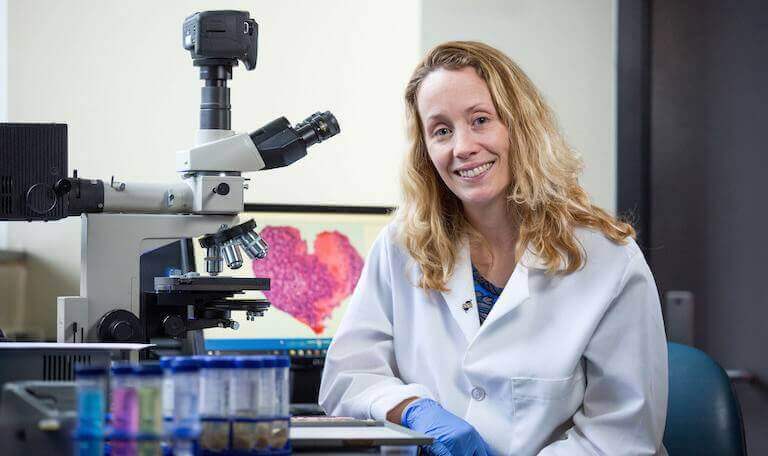Iowa State researchers find obesity impacts reproductive health, increases sensitivity to chemical exposures
Posted Jul 28, 2021

Posted Jul 28, 2021

Iowa State University scientists are finding evidence that obesity alters mammals’ reproductive systems in a variety of ways, including undermining natural abilities to resist and recover from exposures to chemical toxins.
“It has been known for some time that obese women tend to have issues with fertility and related problems, such as earlier onset of both puberty and altered timing of menopause,” said Aileen Keating, professor of animal science and director of the Interdepartmental Toxicology Graduate Program at Iowa State. “Why this is the case, we haven’t really understood.”
Learning why has been the focus of Keating’s research for almost a decade. Her lab has been exploring differences between obese and lean females at different developmental stages and how those differences affect reproductive success. That includes examining how the two groups react to chemical exposures. The research subjects have been mice and pigs, but the findings apply to humans and other mammals.
So far, Keating and students on her research team have found obesity leads to a cascading set of vulnerabilities. These include altering organisms’ ability to resist chemical-induced stress on ovaries and other organs, such as impairing the process of chemical biotransformation, which allows healthy cells to detoxify harmful organic compounds. Obesity even threatens mammals’ genetic structure, reducing the organisms’ ability to repair damage to DNA caused by toxic exposures.
To study these complex, interrelated effects, the team has explored animals’ reactions to a number of chemicals, from chemotherapy drugs to pesticides. A recent paper published in the peer-reviewed journal, “Biology of Reproduction,” presented their findings on relationships between obesity and reproductive health effects from the naturally occurring mycotoxin, Zearalenone (ZEN), sometimes found on moldy grains, cereals and other products.
While the researchers observed different responses to individual chemicals, overall, obesity blunted the mammals’ protective responses to the toxins studied, making reproductive organs and cells more sensitive to damage. Obese females were less able than lean females to withstand damage to proteins that influence DNA. The chemicals caused more harm to their ovaries and depleted egg-producing follicles within the ovaries. In some experiments, no live offspring were born to obese females exposed to toxins, while similarly exposed lean females had relatively normal birth rates.
The changes the researchers have observed lead to life-long health challenges. Longer-term problems include earlier onset of menses, related to fertility beginning at a younger age, and earlier occurrence of menopause, which can exacerbate older females’ health risks from osteoporosis, some cancers and other diseases.
“Clearly, obesity and environmental toxicants represent a variety of challenges for reproduction,” Keating said. “When combined, as they often are in the real world, they appear to multiply detrimental impacts.”
“However,” she emphasized, “we also found that obesity alone alters ovarian protein abundance in ways that can impact fertility, even in the absence of harmful chemicals.”
Keating’s current research is funded by a five-year R01 grant for over $2 million from the National Institute of Environmental Health Sciences (NIEHS), which began in 2020. A new NIEHS Research Supplement to Promote Diversity in Health-related Research, received in May, will provide $195,766 to support the work of a PhD student, Dr. Imaobong Inyang. The federal research supplement program aims to increase workforce diversity in biomedical research to attract more women, first-generation and rural college students and minorities. Inyang, from Nigeria, is the first of her family to earn a college degree. The new award funds her research and associated career-development activities for three years.
Inyang, who already has a degree in veterinary medicine, decided to pursue a PhD in Iowa State’s toxicology program to focus on research. For her degree in Nigeria, she studied the detrimental impacts of a plant extract on male reproduction. That work eventually led her to Keating’s lab. The NIEHS supplement will support their joint efforts to continue exploring complex interactions between obesity, reproductive health and toxic chemicals, including Dimethylbenz[a]anthracene (DMBA), a compound in cigarettes, wildfires and other types of smoke. A unique focus of Inyang’s research is to unravel findings on DMBA’s effects on the livers of developing mammals in-utero.
“This work is fascinating, and I believe the knowledge we are gaining here will have many benefits,” Inyang said.
Ultimately, Keating and Inyang hope to find ways to improve reproductive health for humans and production animals. They are optimistic their research can increase awareness of problems related to obesity and chemical exposures, leading to measures to mitigate some of the threats and develop new treatments.